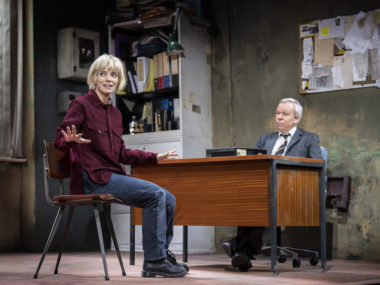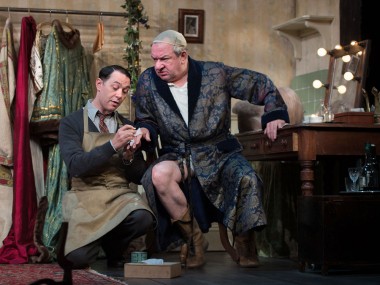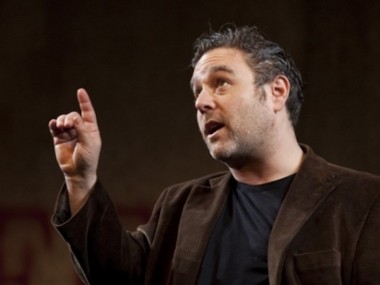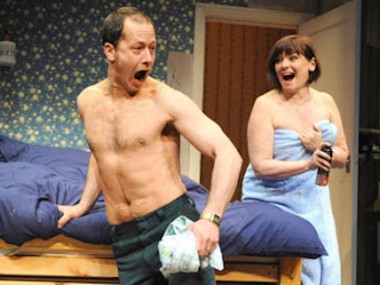The Pillowman, Duke of York’s Theatre
Wednesday 21st June 2023
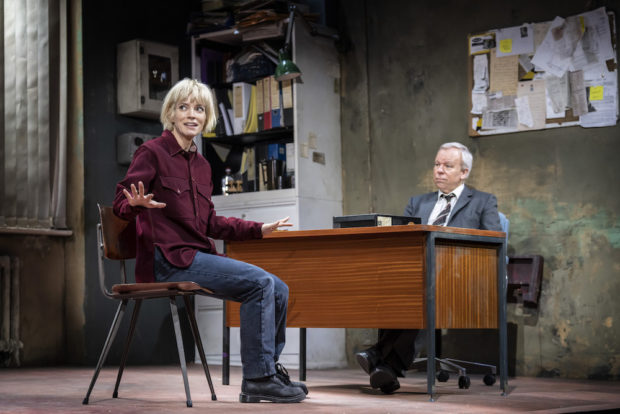
British theatre is getting a bit timid — is that right? Ahead of the opening of this revival of Martin McDonagh’s unforgettable 2003 masterpiece, The Pillowman, its director Matthew Dunster has spoken of the tendency of playwrights and theatres to self-censor nowadays for fear of giving offence. Everyone is getting a bit worried about being cancelled or trolled or attacked for unacceptable opinions. You can see his point: McDonagh is one of those 1990s in-yer-face playwrights whose best work glories in provocation. But Dunster’s West End revival tries to sugar the pill of offence with a star cast which features Lily Allen, Steve Pemberton and Paul Kaye.
Yikes. These actors are stepping into some pretty large shoes: The Pillowman was originally staged at the National Theatre with a superb cast headed by David Tennant, Jim Broadbent, Nigel Lindsay and Adam Godley. It won an Olivier. By changing the gender of Katurian, the main character, from male (Tennant) to female (Allen), Dunster has introduced a touch of diversity into the testosterone-heavy original. But, I’m glad to say, the power and the offensiveness of the play remains horribly alive. As well as its black, black, black humour. Anyway, what’s the play actually about?
Set in an unspecified Eastern European dictatorship, which might — according to the programme — even be Russia, the story begins with the arrest of Katurian (Allen), a writer who works in a local abattoir and lives with her brother Michal, who has learning difficulties. As she is interrogated by two cops — top dog Tupolski (Pemberton) and dimwit Ariel (Kaye) — it emerges that her short stories bear an unmistakable resemblance to a series of shocking killings of children. But is she innocent, and, if so, who is the real killer? While the drama explores both the creativity of storytelling, and the role of family trauma in producing writers, McDonagh spits in the face of good taste and splashes gleefully about in horror.
The play’s aesthetic is gothic hilarity, with lashings of gallows humour and buckets of revolting details. Once one of Katurian’s stories mentions the severed toes of a child, you can guess what the cops produce to show the writer as proof of her guilt. While Tupolski and Ariel engage in banter, cheerfully swapping good cop and bad cop roles, there’s always an edge of violence: they threaten Katurian with mental and physical abuse, and at the same time are so volatile that they could at any moment turn on each other. This builds suspense, and McDonagh’s plotting is superbly controlled. The twists are brilliant — and demonstrate the text’s insistence on the importance of narrative.
While the storytelling, in this play about a storyteller, is genuinely thrilling, other bigger themes soon come barging into the police station. The first suggests that although no one knows how creative geniuses are formed, there is a myth that creatives are the product of childhood trauma. Questions about the political and moral aspects of fiction are sharply articulated. And, as the relationship between the characters develops on stage, their shifting power dynamics are expressed through the increasingly gruesome stories they tell. As well as this, the title of the play refers to a story in which a friendly executioner visits children who are destined to become suicidal as adults and helps them out of this life with the aid of a pillow.
McDonagh has written this extravaganza of extreme fantasies of violence against kids and the powerless with gigantic flair, flicking his one-liners against a whole herd of sacred cows, including playwrights who write what they know, the relationship between fact and fiction, the responsibility of authors for the effects of their imaginative creations, the question of censorship and book burning, police brutality, and the aptness of happy endings. There are jokes about executions, extreme sadism and musings on the longevity of literary creation. These themes are both delivered lightly, with lots of jokes, and so heavy that you can almost hear the boards of the stage creak when they are aired.
If you are susceptible to being offended this play offers a wide choice, from inappropriate words for those with learning difficulties to dodgy asides about Jewish people or black people, not to mention the levity with which child abuse is talked about. Christians might not wholeheartedly appreciate the satire on the life of Jesus. Oh, I nearly forgot, McDonagh also laughs at Chinese people. And I couldn’t find any content warnings on the production’s official site, a deliberate smack in the face of current sensibilities. Oh well. If this play is a manifesto of provocation, which proves its point about censorship by pushing its ideas to the limit, then it certainly succeeds — and then some.
At least it would, if Dunster’s production had a better cast. Choosing a woman as Katurian increases the character’s vulnerability, and Allen, playing the part with the poise and accent of a nice middle-class gal, certainly looks anxious in the presence of the bulky cops. But her range as an actor, however, is limited — here she either whimpers or screeches. The scene in which she is alone with Matthew Tennyson, who plays her brother Michal, is noticeably slack. In the end, I found her interpretation of Katurian unconvincing and unengaging, lacking depth and desperation. This means that nothing seems to be at stake in this version — it’s hard to care about a character who is so detached from their own obsessions.
The best scenes are those dominated by Pemberton’s amusingly sinister Tupolski and Kaye’s maniacal Ariel. Their performances are masterpieces of comic timing and verbal flair. In some passages, the production features lovingly grotesque moments, as when Katurian offers flashbacks of her life, or when her stories are acted out on stage, whose gloom-drenched colours by designer Anna Fleischle add to the evening’s deranged pleasures. The atmosphere of brooding nightmarish horror, helped by Neil Austin’s lighting and Dick Straker’s videos, is occasionally beautifully delivered. At a time when safe revivals outnumber edgy new work in the West End, this must be, if you can forgive Allen’s lite acting, the most disturbing play in town.
This review first appeared on The Arts Desk

